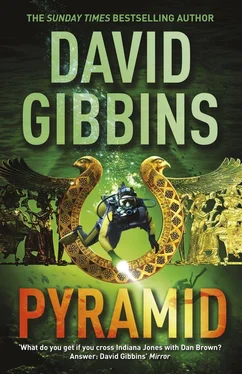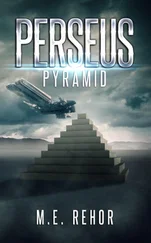“One question,” Costas said. “Caliph Al-Hakim wouldn’t have been able to read hieroglyphs, right? Of all the thousands of papyrus documents lying around in that chamber, how come he chose the one that’s so significant?”
“Ah.” Aysha nodded to Hiebermeyer, who scrolled through a series of photos on the screen. “The answer lies in the memory chip that you so carefully,” she coughed, “concealed on your person.”
“Excellent. My treasure trove. I knew it would be useful.”
“These pictures are the most incredible I’ve ever seen, outstripping even those famous first images that Howard Carter took of Tutankhamun’s tomb,” Hiebermeyer said. “Without these pictures and that scrap of papyrus, we’d have nothing tangible to go on. I for one owe you a very large gin and tonic.”
“There it is,” Aysha said, pointing at the screen. The photo showed the huge golden sarcophagus, the lid slightly ajar where Jack had tried so hard to push it. Hiebermeyer zoomed in to the central part below the crossed arms holding the scepter and the ankh symbol. A curious black wood embellishment like a picture frame lay on the lid below, its interior edges jagged like the broken remains of a windowpane.
“I get it,” Costas exclaimed. “Al-Hakim found that papyrus inside that frame.”
Aysha nodded. “You can see where he tore it out. He couldn’t read it, but he guessed that it must be some kind of holy text. He held it close to him as he died.”
“There’s something else we want to show you, Jack,” Hiebermeyer said. “Something else to close the story.”
“Go on.”
Hiebermeyer tapped the laptop and an image of a stone slab covered with hieroglyphs came into view. “This is the so-called Israel Stele, set up in Thebes in the late thirteenth century BC to commemorate the conquests of the pharaoh Merenptah. It’s famous as the only known reference to Israel in an ancient Egyptian inscription. But it now takes second place to Rebecca’s find of the Israel cartouche under Temple Mount in Jerusalem dating at least a century earlier to the time of Akhenaten or shortly after. Here you can see the two cartouches side by side, showing how they contain identical hieroglyphs.”
“Tell them Rebecca’s theory,” Aysha said.
Hiebermeyer sat back in his chair and looked pensively at the image. “When Rebecca emailed me her photo of the Jerusalem find, she outlined a startling idea. The other conquered enemies listed in the Stele — Canaan, Ashkelon, Gezer, Yenoam, and Syria — were all city-states or confederations, whereas the determinative hieroglyph written in front of the word for Israel shows that Israel was regarded as a people, not a city. And yet at this date it seems hardly plausible that a nomadic people or a marauding band of warriors would have the strength to oppose an Egyptian army, to be considered opponents worthy enough to list in this fashion. Rebecca then pointed out one city that was missing from the list.”
“Mât Urusalim,” Jack said. “Jerusalem.”
“Exactly,” Hiebermeyer continued. “Jerusalem was a significant citadel, on a par with the coastal cities and a gateway for any Egyptian army intent on conquering farther north. Either the alliance revealed in the Amarna letters with Akhenaten still remained in force, or, more likely, Mât Urusalim actually is there in the list, only under a different name.”
“Israel,” Jack murmured.
Hiebermeyer nodded enthusiastically. “Here’s a scenario. In the century or so between their arrival as refugees from Egypt and the campaigns of Merenptah, the Israelites had taken over and transformed Jerusalem, strengthening it with their knowledge of Egyptian engineering and winning over the people to their new religion. Rebecca thinks the origins of the Jewish state lie then, not several centuries later with the arrival of King David, as the Old Testament would seem to suggest.”
“So who exactly were the Israelites?” Costas asked.
“I think they may originally have been a tough hill people of Canaan, a large enough component of the prisoners captured by the Egyptians in earlier wars of conquest for the name to have stuck. But the migration from Egypt recounted in Exodus probably included peoples of diverse origins. Imagine the composition of a Roman slave revolt, for comparison. At certain periods it would be dominated by prisoners from the current wars, Gaulish, Spanish, or Macedonian, for example, but there would always be others from different parts of the ancient world, some very exotic. In the same way, you can imagine the followers of Moses predominantly claiming Canaanite origins but including a diversity of others whom the Egyptians had enslaved, from captured sailors of the Red Sea and Indian Ocean to Nubians and Saharan nomads. This ethnic diversity may well have been one of the strengths of the early Jewish state and religion.”
Lanowski pointed at the first hieroglyphs in the cartouche, the determinative of a throw stick, a sitting man and a woman. “That’s what does it for me. Israel was a people, not a land. A people is always restless, always wanting to be on the move, seeking a promised land that lies just out of reach. The refugees from Egypt may have settled in Jerusalem, but that yearning was always in their blood. You can see it in the history of the diaspora, in that tension between the lure of the Holy Land and the spiritual and creative strength that came from not quite getting there. You can see it in the life of a man like Yehuda Halevi. Would he have been such a great poet if he had reached the Holy Land as a younger man?” Lanowski turned to Jack. “Would you be such a great archaeologist, such a good storyteller, if your Holy Grail didn’t lie most of the time just over the horizon, just beyond your reach?”
“Speaking of horizons, I wonder what really did happen to Akhenaten,” Aysha said.
“The sun rises in the east, and sets in the west,” Costas murmured.
“What did you say?” Jack said.
“Well, if you’re going to worship the sun, you look east or you look west. It’s too bright in the middle.”
“Moses and the Israelites went east,” Lanowski said.
“So which way did Akhenaten go?” Jack tapped his pencil, staring at the image of the empty coffin, and then swivelled the map on the table so that his line of sight took him from Egypt across North Africa and beyond, due west.
“Uh-oh,” Costas said, peering at him. “It’s that look again.”
“You know all those theories about the origins of the pyramids in Mesomerica?” Jack said. “We need to look at every scrap of evidence, and I mean every scrap, for Egyptian exploration to the west. If Akhenaten set off in search for his own promised land, it could be anywhere west of Libya.”
“I’m on it,” Lanowski said, sliding the laptop in front of him, brushing his hair aside, and pushing up his little round glasses. “I’ll start with the fringe stuff first. I’m pretty good at working out which of those theories are crackpot and which have a modicum of sanity behind them. Some of those guys are alarmingly like me.”
“Maurice?” Jack said.
Hiebermeyer stared at the map and slowly nodded. “After finishing at the mummy necropolis, my new project was going to be an excavation near Mersa Matruh, a trading site on the Mediterranean coast of Egypt close to the Libyan border. Aysha and her team had already begun to evaluate all the known evidence for Egyptian trade farther west. One of the most intriguing reports comes from the early Phoenician outpost at Mogador, on the Atlantic coast of Mauretania, where surface finds have apparently included fragments of New Kingdom pottery.”
“Fourteenth century BC?” Jack said.
“It’s possible.”
“We have a standing invitation to excavate there,” Aysha said.
Читать дальше












